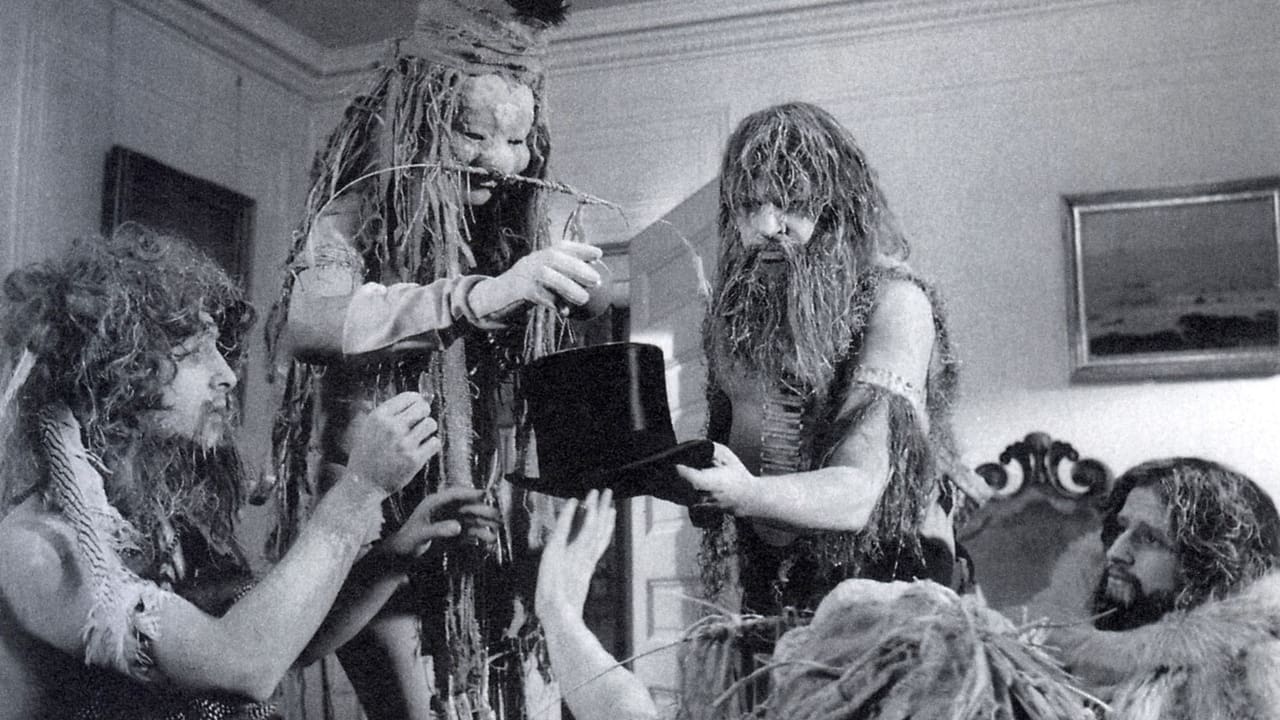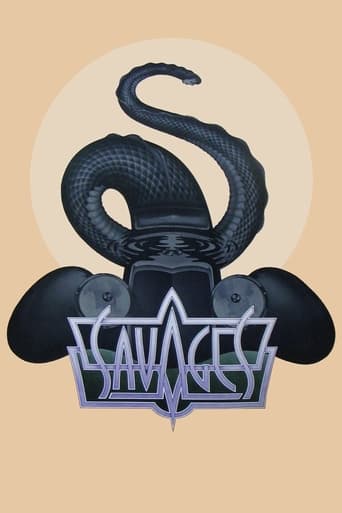Incannerax
What a waste of my time!!!
Tockinit
not horrible nor great
Joanna Mccarty
Amazing worth wacthing. So good. Biased but well made with many good points.
Micah Lloyd
Excellent characters with emotional depth. My wife, daughter and granddaughter all enjoyed it...and me, too! Very good movie! You won't be disappointed.
MARIO GAUCI
Having read that this unusual James Ivory-Ismail Merchant production was a pseudo-Bunuelian concoction, I thought I’d acquire it for my long-planned Luis Bunuel tribute on the 25th anniversary of his death (which occurred on 29th July 1983). Now that I’ve watched it, apart from the obvious thematic allusions to ROBINSON CRUSOE (1952), I’d say that it’s also a half-baked inversion of THE EXTERMINATING ANGEL (1962) which, apart from the occasional amusing passage, fails to entertain or enlighten the viewer, much less do justice to its intriguing subject matter.For being such a radical stylistic departure for them (even at that early a stage in their careers) and the film’s own satirical intent, it might not be as surprising to learn that Merchant-Ivory here engaged two young writers from the “National Lampoon” school – George Swift Trow and Michael O’Donoghue (later also of “Saturday Night Live”) – to pen the script, not to mention the title track! The latter plays over an animated dramatis personae which introduces us to an archetypal assortment of upper-class citizens complete with clichéd monikers typical of Silent cinema (a bully, a capitalist, a decadent, the limping man, etc.). After this lengthy prelude, a curiously-drawn intertitle “The Mud People” plunges us in a black-and-white world of a group of scavenging prehistoric people. We follow their rituals for the next ten minutes or so (including the yearly ‘death by stoning’ of their queen’s consort) until a flying croquet ball unaccountably lands in front of them. The repercussions of this mundane event are, for a little time at least, as life-altering as the monolith had been to the apes in Stanley Kubrick’s 2001: A SPACE ODYSSEY (1968) or the Coke bottle would be to Jamies Uys’ African bushmen in THE GODS MUST BE CRAZY (1980)…but again, the end result hardly proves itself as enthralling as the former or as funny as the latter.Admittedly, the interesting ensemble casting of Susan Blakely, Thayer David, Salome Jens, Martin Kove, Sam Waterston and Kathleen Widdoes does work rather admirably where – as inexplicable as the central conceit of THE EXTERMINATING ANGEL itself – we see these brutes coming upon an abandoned mansion in the woods which they start exploring and, seemingly soon after, change into the socialite-types seen in that prologue with the requisite immaculate English diction! The screen also reverts back to color at this point setting the stage for a long society party segment with its typical show of the malaises of the civilized world in this ‘modern’ age (greed, lust, power, jealousy, etc.). Within the film’s context, I guess, the fact that one (or perhaps two) of the guests seem to be in drag for no good reason can be excused but I have to say I was startled to see included towards the end a steamy lesbian encounter in a car which, unsurprisingly, heralds the start of the savages’ regression to their original uninhibited state.
lar3579
Based upon release dates, I was provided with this version as opposed to the 2007 film of the similar name. Keeping an open-mind, I watched patiently.People will celebrate its oddness of colliding civilizations and languages while also mentioning the threads of overlap in poor behavior in both the 'mudpeople' and the merely dressed better actors - this is not enough to make a good film. To fixate on the eccentricities without considering the cohesive whole does anyone considering spending time with this film a disservice. To start, instead of developing the divide between words and actions, the plot moves forward without leaving the viewer with any motif. Stylistically, not providing moments of quiet with the camera to draw out the characters' inner thoughts makes this picture forgettable. Utterly two-dimensional, I pity Sam Watterson's involvement.There is humor unintentionally created by death and the indifference by the other characters. Amusement is highlighted at the end. The people's hysterical and manic attraction to merge with the jungle once more is laughable. Who knew croquet was so powerful?
david melville
Was it de Tocqueville who wrote that America passed from barbarism to decadence with no civilization in between? If so, then he (or whoever else) deserves at least partial screen credit for Savages. A bizarre and blackly comic fable, this is Merchant-Ivory's most atypical film. It was also, probably, their biggest flop. Yet fans of the duo will find much recognise and admire. Non-fans may enjoy it even more!Savages opens in dazzling sepia-toned black-and-white. A tribe of primitive forest-dwellers called the 'Mud People' find a mystical round orb that's fallen from an alien world. (In other words, a croquet ball.) They trace its path to an elegantly dilapidated Colonial-style mansion. As they explore the house, the prehistoric intruders start to play dress-up. Soon enough, the screen shifts into colour. The 'savages' transform into the denizens of a grandly decadent 1920s house party...Chief among them are a formidable Auntie Mame-style hostess (Anne Francine), a toothy and spirited debutante (Susan Blakely), an elegantly faded 'fallen woman' (Salome Jens) and an exotic, eyelash-fluttering vamp (legendary Andy Warhol icon Ultra Violet). As usual in a Merchant-Ivory film, the women's roles are stronger than the men's. But a young Sam Waterston is on hand, rehearsing his 'detached and disenchanted observer' role for The Great Gatsby.While that later film is little more than a parade of gorgeous costumes and opulent sets, Savages is considerably more. Ivory's eye for social nuance and period detail is as sharp here as in later masterworks like Quartet, Heat and Dust and A Room with a View. Yes, it may perhaps be possible to dismiss Ivory as a bland director - but only if you dismiss Jean Rhys, E.M. Forster or Henry James as bland authors. Or is it a crime to be a discreet and faithful adaptor of other people's work?Savages is one of the rare films based on Ivory's own imagination. And what a perverse and mordant imagination it turns out to be! What little 'civilisation' the 'savages' acquire in the guise of Jazz Age socialites is, of course, a flimsy and feeble veneer. We can't be surprised when they revert to full-fledged barbarism. In fact, the honesty of that primal state comes as something of a relief.Savages is impeccably acted, smoothly directed, wittily written, richly designed - and photographed with jaw-dropping splendor by Walter Lassally! It may be something of an aberration in the Merchant-Ivory canon. It is also, possibly, their best film.
craigjclark
Arguably one of the most bizarre films Merchant-Ivory ever produced, "Savages" is definitely a product of its times (the late '60s/early '70s), yet it still holds certain charms. James Ivory may have come up with the original idea, but it's screenwriters Michael O'Donoghue and George Swift Trow who made the most of the concept, offering up examples of all types of physical and verbal savagery.The film's a little slow at the start -- after the opening credits it runs like a silent black and white film (with title cards and everything) for some time -- but stick around long enough and it becomes sepia-toned and finally full color as the Mud People take on the outward appearances of high society while still retaining their primitive identities.Recommended for fans of O'Donoghue's acid wit and anyone who isn't afraid of satire.

